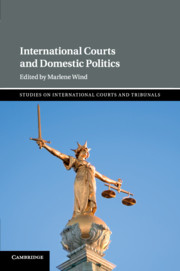Book contents
- International Courts and Domestic Politics
- Studies on International Courts and Tribunals
- International Courts and Domestic Politics
- Copyright page
- Contents
- Figures
- Tables
- Contributors
- Abbreviations
- Preface
- Introduction
- 1 ‘Missing in Action? The Rare Voice of International Courts in Domestic Politics’
- Part I
- 2 What Can Financial Markets Tell Us about International Courts and Deterrence?
- 3 The Strasbourg Court and Domestic Judicial Politics
- 4 It’s a Good Idea … Isn’t It? The Impact of Complementarity at the International Criminal Court on Domestic Law, Politics and Perceptions of Sovereignty
- 5 Rights-Protecting iCourts: The Curious Case of the OP-ICESCR
- 6 Reassembling the French State via Human Rights: Between Human Rights Internationalism and Political Sovereignism
- 7 Impact through Trust: The CJEU as a Trust-enhancing Institution
- Part II
- Index
- References
3 - The Strasbourg Court and Domestic Judicial Politics
from Part I
Published online by Cambridge University Press: 23 June 2018
- International Courts and Domestic Politics
- Studies on International Courts and Tribunals
- International Courts and Domestic Politics
- Copyright page
- Contents
- Figures
- Tables
- Contributors
- Abbreviations
- Preface
- Introduction
- 1 ‘Missing in Action? The Rare Voice of International Courts in Domestic Politics’
- Part I
- 2 What Can Financial Markets Tell Us about International Courts and Deterrence?
- 3 The Strasbourg Court and Domestic Judicial Politics
- 4 It’s a Good Idea … Isn’t It? The Impact of Complementarity at the International Criminal Court on Domestic Law, Politics and Perceptions of Sovereignty
- 5 Rights-Protecting iCourts: The Curious Case of the OP-ICESCR
- 6 Reassembling the French State via Human Rights: Between Human Rights Internationalism and Political Sovereignism
- 7 Impact through Trust: The CJEU as a Trust-enhancing Institution
- Part II
- Index
- References
Summary
This chapter discusses to what extent and how the European Court of Human Rights (ECtHR) has engaged in domestic judicial design. It shows that the judgments of the Strasbourg Court, rather than having effects only with respect to the individual whose rights have been violated, has much deeper structural effects in the design and operation of domestic judicial systems. This chapter argues that this phenomenon goes rather unnoticed, but it has deep implications for both the developing and developed democracies. To demonstrate this phenomenon, the chapter assesses the impact of the ECtHR on three judicial design issues. First, it illustrates how the ECtHR has challenged the role of the advocates general. Second, it explains how the ECtHR has gradually curbed the jurisdiction of military courts over both civilians and military officers, which has brought these courts to the brink of their abolition. Finally, it outlines how the ECtHR in its judgments regarding the disciplining of judges empowers the judiciary at the expense of other political institutions within the State. Based on the analysis of these three judicial design issues, it concludes that the Strasbourg Court is affecting the internal architecture of domestic judiciaries as it gradually endorses the unification of court administration and changes the power structures within the judiciary. Interestingly, neither the established democracies nor the developing countries have shown significant resistance to these far-reaching requirements that impinge upon the cornerstones of domestic judicial systems. This chapter proposes possible explanations of why this is so and identifies avenues for further research.
- Type
- Chapter
- Information
- International Courts and Domestic Politics , pp. 71 - 92Publisher: Cambridge University PressPrint publication year: 2018
References
- 1
- Cited by

